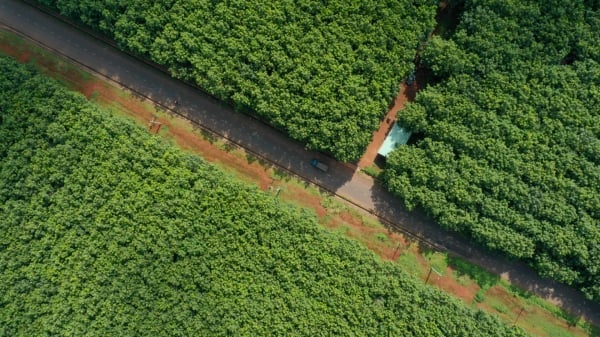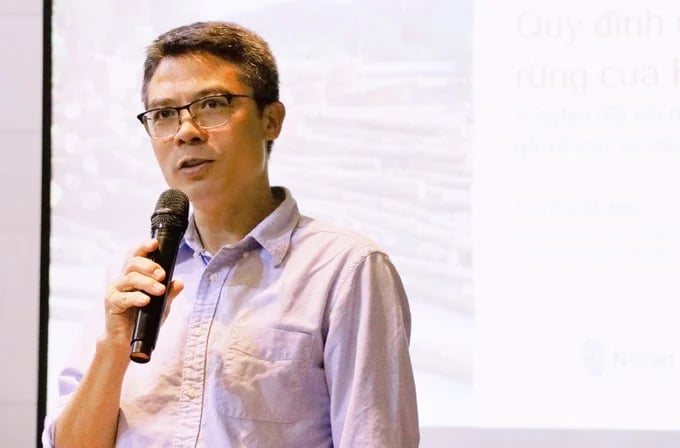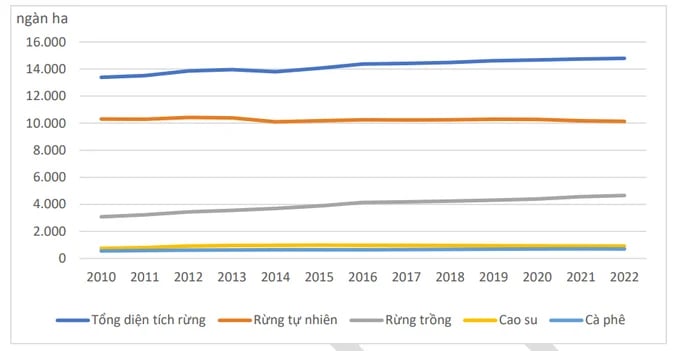May 30, 2025 | 10:06 GMT +7
May 30, 2025 | 10:06 GMT +7
Hotline: 0913.378.918
May 30, 2025 | 10:06 GMT +7
Hotline: 0913.378.918

Green growth and sustainable development are the goals of many businesses. Photo: Tung Dinh.
Dr. To Xuan Phuc, managing director of Forest Trends’ Forest Policy, Trade, and Finance Initiative, shared insights into the EU Deforestation-free Regulations (EUDR).
Dr. To Xuan Phuc said that according to EUDR, a benchmarking system operated by the European Commission would classify countries, or parts thereof, into three categories (high, standard and low risk) according to the level of risk of producing in such countries commodities that are not deforestation-free.
In addition, the EU can use additional information criteria from national regulatory agencies and information from companies, NGOs, and third parties about efforts to reduce emissions. National agreements and mechanisms signed with the EU to combat deforestation, participation in emission reduction initiatives, carbon markets, and the level of information sharing and dissemination are also factors the EU will analyze.
Thus, the EU will apply criteria to benchmark production regions within that country before the final decision on December 30, 2024.
Vietnam currently has three products – coffee, rubber, and wood – listed industries affected by EUDR. Mr. Phuc acknowledged that the export motivation, supply chain and risk of deforestation for each of these products are different.
“Vietnam will be disadvantageous if the EU takes the commodity with the highest risk of deforestation as the basis for national risk labeling. To avoid this risk, representatives of industries and agencies are required. Management needs to exchange and cooperate closely to unify approaches across industries”, Dr. To Xuan Phuc emphasized.

Dr. To Xuan Phuc, Forest Trends’ Forest Policy, Trade, and Finance Initiative, spoke on the afternoon of November 2. Photo: Phuong Thao.
The expert said that, in case industries have different developments in their readiness to meet EUDR requirements, he recommends that the Government consider asking the EU to classify risks according to EUDR requirements. For each specific product industry, do not combine them when labeling risks.
In addition, Mr. Phuc also proposed that management agencies review and evaluate the supply chains of the three current industries, proactively share information with the EU on the current status of each industry’s supply chains, and strengthen inspection activities. Control and trace the chain, and protect natural forests.
“This is an important source of input information that helps the EU accurately and objectively assess the level of deforestation risk in the production country/region. The lack of this input information can lead to Vietnam being ranked in the high-risk group. This will bring a major negative impact to all three industries mentioned above,” noted Forest Trends representative.
Vietnam’s three important commodity industries currently exporting to the EU are listed as affected (coffee, rubber, wood) with an annual export turnover of nearly 3 billion USD, however, The current supply chain is relatively complicated.
Specifically, the wood industry supply chain has nearly 4 million hectares of production forests, including nearly 1.5 million hectares of more than 1 million households. The supply of wood from planted forests yearly is over 24 million m3, over half of which comes from households.
Products using planted forest wood exported to the EU include furniture, exterior furniture, and wooden panels. Currently, only 12% of the area has a sustainable forest management certificate. The supply chain is complex, includes many participants, and is difficult to trace, especially for uncertified areas.

Forest developments and production area of 3 products, period 2010 - 2022. Source: General Statistics Office.
The rubber industry supply chain has over 900 thousand hectares, more than half of which is smallholder rubber. The certified area accounts for 14%, almost all large land. Imports from Laos and Cambodia are large, not completely legal, difficult to control, and currently cannot be traced, especially rubber originating from smallholders.
The coffee supply chain has an area of about 700 thousand hectares, over 90% of which is smallholder coffee, each household has 2-3 plots of land. The certified area accounts for about 40%. The commercial coffee supply chain without certification is extensive and complex.
According to Forest Trends, although the risk of deforestation related to the production of these three commodity industries is not large, the cultivated area is generally stable. However, there still exist some supply chain issues that hinder return to traceability.
This may affect the results of the EU’s risk assessment and classification by country/production region in the future, directly impacting Vietnamese businesses selling goods to the EU.
Immediately after the EU Deforestation-free Regulation (EUDR) officially took effect on June 29, 2023, in August 2023, the Ministry of Agriculture and Rural Development issued the EUDR Adaptation Action Plan Framework, focusing on increasing monitoring of high-risk areas, proactively exchange with the EU, build a national database, and review field maps. The Ministry also requests the People’s Committees of the provinces to implement this National Framework.
Translated by Quynh Chi

(VAN) Ms. Nguyen Thi Dung, Deputy Director of Ngoc Hoang Cooperative, shared about the journey of bringing dragon fruit to Europe, achieving annual revenues in the billions of VND.

(VAN) Bamboo products from Thang Tho Bamboo Cooperative have reached many countries around the world, while also creating jobs for local workers.

(VAN) The Management Board of Con Dao National Park reported that a green sea turtle, tagged in the Philippines, has traveled thousands of kilometers to lay 84 eggs on Bay Canh Islet.

(VAN) Green technology is paving a new path for sustainable aquaculture in the Mekong Delta in particular and across the country in general, helping reduce emissions and adapt to climate change.

(VAN) On May 27, La French Tech Vietnam (the French startup and innovation community in Vietnam) held the French Tech Summit Vietnam 2025.
/2025/05/27/4731-2-223159_980.jpg)
(VAN) No votive paper, no styrofoam, no plastic bags, no plastic bottles, and no single-use plastic trays are the key rules tourists should keep in mind when visiting Con Dao.

(VAN) In the fight against plastic pollution, Vietnam has been demonstrating a proactive, pioneering, and active role in addressing the greatest environmental challenge today.